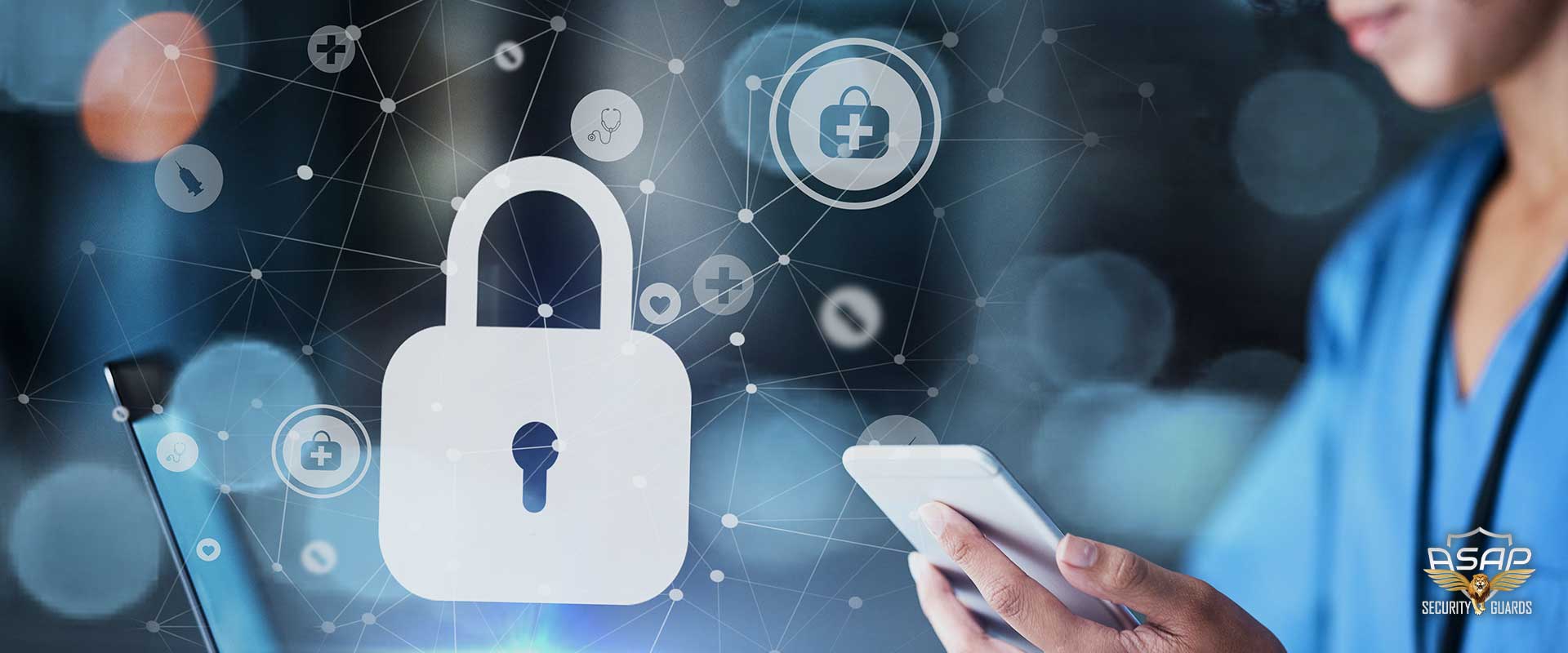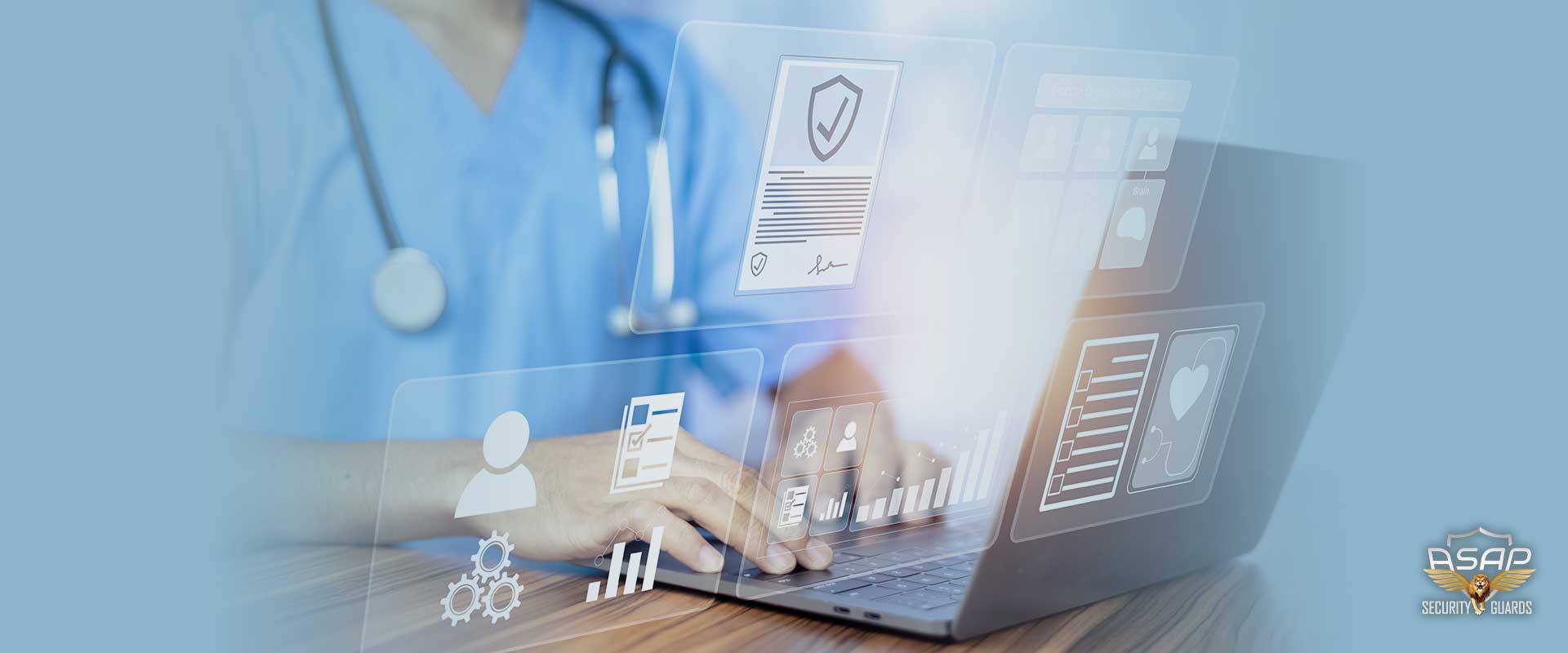Healthcare institutions face the challenge of preserving patient confidentiality while implementing robust security measures to protect sensitive information. Additionally, physical security, such as hospital security guard services, is crucial in safeguarding patients and staff. Balancing these aspects is essential to ensure the trust and well-being of patients. This article explores the intricacies of patient privacy, the role of security measures, including physical security services, the delicate balance between the two, and future trends in this evolving landscape.

Understanding Patient Privacy
Patient privacy is the fundamental right of individuals to control the access and disclosure of their personal health information. It encompasses safeguarding sensitive data, such as medical records, treatment plans, and laboratory results, from unauthorized access or use. It also involves ensuring that only authorized individuals can interact with or see the patient while they are in the hospital. By maintaining patient privacy, healthcare providers earn the trust and respect necessary to foster open and honest communication between patients and healthcare professionals.
Defining Patient Privacy
Patient privacy extends beyond protecting physical and electronic health records. It includes demographic data, payment information, and any other information that could potentially identify an individual. Additionally, it involves physical privacy, ensuring that only those who are authorized can interact with or see the patient. This includes keeping unauthorized individuals away from patients and ensuring that sensitive conversations and treatments are conducted privately.
Importance of Patient Privacy in Healthcare
Patient privacy is of paramount importance in healthcare for several reasons. Firstly, maintaining privacy supports ethical and legal obligations to protect patient confidentiality and autonomy. Secondly, it encourages patients to seek the care they need without the fear of judgment or potential harm from breaches of privacy. Lastly, it enhances healthcare outcomes by enabling patients to be open and honest about their conditions, which assists healthcare professionals in making accurate diagnoses and treatment plans.
Legal Aspects of Patient Privacy
Protecting patient privacy is not just an ethical thing to do, but it is also a legal requirement. Laws such as the Health Insurance Portability and Accountability Act (HIPAA) in the United States mandate strict guidelines for safeguarding patient data. Penalties for non-compliance can be severe and can include monetary fines and even criminal charges. Therefore, healthcare organizations must have measures in place to uphold patient confidentiality and privacy.
Furthermore, patient privacy is not only a concern within healthcare facilities but also extends to the digital realm. With the increasing use of technology in healthcare, there is a growing need to protect patient information from cyber threats. Healthcare organizations must invest in robust cybersecurity measures to prevent unauthorized access to electronic health records and other sensitive data.
In addition to legal requirements, healthcare providers have an ethical duty to educate their staff on the importance of patient privacy. This includes training employees on how to handle patient information securely and ensuring they understand the potential consequences of privacy breaches. By fostering a culture of privacy awareness, healthcare organizations can create an environment that prioritizes patient confidentiality and builds trust with patients.

The Role of Security Measures in Healthcare
While patient privacy is vital, it is equally crucial to implement robust security measures to protect patient data from unauthorized access, disclosure, or breaches. Security measures fortify the confidentiality, integrity, and availability of patient information, preventing data breaches and unauthorized disclosures. Additionally, physical security measures are necessary to protect the safety and privacy of patients and healthcare staff.
The Need for Security Measures
Healthcare organizations are high-value targets for cybercriminals due to the wealth of digital patient data they possess. With the increasing adoption of electronic health records and interconnected systems, the risk of data breaches has grown exponentially. Consequently, the need for security measures, such as firewalls, encryption, and access controls, has become paramount to safeguard patient information from cyber threats.
Different Types of Security Measures
Security measures in healthcare can be categorized into administrative, physical, and technical safeguards. Administrative safeguards include policies, procedures, and training to create a culture of security awareness among healthcare staff. Physical safeguards involve physical barriers, such as locked doors and security personnel, to limit access to sensitive areas. Technical safeguards encompass encryption, authentication, and authorization protocols to protect electronic data from unauthorized access or tampering.
 The Role of Physical Security in Healthcare
The Role of Physical Security in Healthcare
While digital security measures are crucial, physical security is equally important in ensuring the safety and well-being of patients and staff in healthcare facilities. Hospital security guard services play a vital role in maintaining a secure environment by providing a visible security presence, managing access control, and responding to incidents promptly.
Importance of Hospital Security Guard Services
Hospital security guards help deter potential threats, prevent unauthorized access to restricted areas, and ensure a safe environment for patients, visitors, and healthcare staff. They are trained to handle various situations, from managing aggressive behavior to responding to emergencies, thereby enhancing the overall security posture of healthcare facilities. Moreover, security guards play a crucial role in maintaining the physical privacy of patients by ensuring that only authorized personnel and visitors can access patient areas.
Key Responsibilities of Hospital Security Guards
Access Control: Security guards manage entry points, ensuring that only authorized individuals can access specific areas. This helps protect sensitive areas such as intensive care units, pharmacies, and administrative offices.
Patrolling: Regular patrols by security guards help identify and mitigate potential security risks, such as unattended bags or suspicious activities. Their presence alone can act as a deterrent to criminal activity.
Emergency Response: Security guards are often the first responders in emergencies, providing immediate assistance and coordinating with law enforcement or medical personnel as needed.
Visitor Management: By monitoring and managing visitor access, security guards help ensure that visitors adhere to hospital policies and do not compromise the safety and privacy of patients.
Enhancing Physical Security with Technology
To further bolster physical security, healthcare facilities can integrate technology such as surveillance cameras, alarm systems, and electronic access control systems. These technologies, combined with the presence of trained security personnel, create a comprehensive security strategy that addresses both digital and physical threats.
Get In Touch
Our staff of Hospital Security professionals are ready to hear from you!

The Intersection of Patient Privacy and Security Measures
The relationship between patient privacy and security measures is a delicate balance. While security measures are crucial for protecting patient data, they should not hinder or compromise patient privacy. Healthcare organizations must strike the right equilibrium between these two aspects to maintain patient trust and ensure the continuous delivery of high-quality care.
The Delicate Balance
Striking a balance between patient privacy and security measures requires a comprehensive approach. It involves implementing stringent security measures while upholding patients’ rights to control the disclosure of their health information. This balance can be achieved by implementing least-privilege access controls, data encryption, and anonymization techniques to preserve privacy while maintaining adequate protection against security threats. Additionally, hospital security guard services can help maintain this balance by ensuring that only authorized individuals can interact with patients.
However, it is important to note that this delicate balance is not a static state but an ongoing process. As technology advances and new threats emerge, healthcare organizations must continuously adapt their security measures to safeguard patient privacy effectively. Regular assessments and audits are essential to identify vulnerabilities and implement necessary improvements.
Potential Conflicts and Solutions
In some instances, conflicts may arise between patient privacy and security measures. For example, stringent security measures that limit access to patient data may impede healthcare professionals’ ability to provide timely care. To overcome these conflicts, healthcare organizations can implement role-based access controls, ensuring that only authorized individuals have access to specific patient information. Regular communication and collaboration between privacy officers, IT professionals, healthcare providers, and security personnel are critical to finding sustainable solutions.
Moreover, it is crucial to involve patients in the decision-making process when addressing conflicts between privacy and security. By actively seeking patient input and feedback, healthcare organizations can gain valuable insights into their preferences and concerns. This patient-centered approach can help identify innovative solutions that strike a balance between privacy and security while also meeting patients’ needs.
The Role of Technology in Balancing Privacy and Security
Technology plays a vital role in striking a balance between patient privacy and security measures. Innovative solutions, such as advanced authentication methods, secure messaging platforms, and data loss prevention tools, can enhance security without compromising privacy. Additionally, advancements in artificial intelligence and machine learning can assist in identifying potential privacy breaches or security threats, enabling proactive measures to be taken.
However, it is important to recognize that technology alone is not the only solution. Healthcare organizations must also invest in training and educating their staff on privacy and security best practices. By fostering a culture of privacy and security awareness, healthcare professionals can become active participants in maintaining the delicate balance between patient privacy and security measures.

Future Trends in Patient Privacy and Security Measures
The landscape of patient privacy and security measures will continue to evolve as technology advances and new challenges emerge. Keeping abreast of these trends is crucial for healthcare organizations as they strive to protect patient information and comply with regulatory requirements.
Emerging Technologies and Their Impact
Emerging technologies, such as blockchain and secure cloud storage, hold immense potential to revolutionize patient privacy and security. Blockchain technology offers enhanced data integrity and traceability, ensuring that patient records remain tamper-proof. Additionally, it enables secure and transparent sharing of information between healthcare providers, improving care coordination and patient outcomes.
Secure cloud storage, on the other hand, provides scalable and resilient solutions for storing sensitive patient data, reducing the risk of data breaches. With the ability to encrypt data at rest and in transit, healthcare organizations can confidently store and access patient information without compromising privacy or security.
Predicted Challenges and Opportunities
As technology advances, new challenges will inevitably arise. Healthcare organizations must grapple with the growing complexities of securing patient data while maintaining privacy. The increasing use of connected devices and remote patient monitoring poses additional security risks that must be addressed. However, these challenges also present opportunities for innovation, collaboration, and the development of robust privacy and security frameworks.
One such opportunity lies in the implementation of artificial intelligence (AI) and machine learning (ML) algorithms to detect and prevent potential security breaches. By analyzing patterns and anomalies in data access and usage, AI and ML can help healthcare organizations identify and mitigate security risks proactively.
Preparing for the Future of Patient Privacy and Security
Preparing for the future of patient privacy and security requires a proactive and adaptable approach. Healthcare organizations must invest in continuous staff education and training to mitigate evolving security risks. Regular reviews of policies and procedures, coupled with the implementation of cutting-edge security technologies, will ensure that patient privacy remains protected in an increasingly connected healthcare ecosystem.
Furthermore, fostering a culture of privacy and security awareness among staff and patients is paramount. By promoting a shared responsibility for protecting patient information, healthcare organizations can create a strong defense against potential threats.

The balancing act between patient privacy and security measures is critical to the well-being of patients and the integrity of the healthcare industry. While patient privacy is a fundamental right, security measures, including both digital protections and physical security services like hospital security guards, are essential for protecting sensitive data from breaches and unauthorized access. By understanding the complexities of patient privacy, implementing robust security measures, and staying abreast of emerging trends, healthcare organizations can successfully navigate this delicate balance, ensuring the confidentiality and security of patient information for years to come.
Reach out to ASAP Security now for any questions or if you need a quote.
We are proud of our stellar customer service record, so check our website for all the testimonials from our various satisfied customers. Call ASAP Security at 1-833-272-7247
Healthcare and Security and Privacy – Frequently Asked Questions (FAQ)
1. Why is patient privacy important in healthcare?
Patient privacy is crucial for several reasons. It supports ethical and legal obligations to protect patient confidentiality and autonomy, encourages patients to seek care without fear of judgment or harm from privacy breaches, and enhances healthcare outcomes by enabling open and honest communication between patients and healthcare professionals.
2. What legal requirements exist to protect patient privacy?
Laws such as the Health Insurance Portability and Accountability Act (HIPAA) in the United States mandate strict guidelines for safeguarding patient data. Non-compliance can result in severe penalties, including monetary fines and criminal charges. Healthcare organizations must have measures in place to uphold patient confidentiality and privacy.
3. What types of security measures are essential in healthcare?
Security measures in healthcare can be categorized into administrative, physical, and technical safeguards. Administrative safeguards include policies, procedures, and training. Physical safeguards involve barriers like locked doors and security personnel. Technical safeguards encompass encryption, authentication, and authorization protocols to protect electronic data.
4. What role do hospital security guards play in healthcare facilities?
Hospital security guards are essential for maintaining a secure environment. They help deter potential threats, prevent unauthorized access to restricted areas, ensure a safe environment for patients, visitors, and staff, manage access control, conduct regular patrols, respond to emergencies, and manage visitor access to adhere to hospital policies.
5. How do healthcare organizations balance patient privacy and security measures?
Balancing patient privacy and security measures involves implementing stringent security protocols while respecting patients’ rights to control their health information. This balance is achieved through measures such as least privilege access controls, data encryption, anonymization techniques, and the involvement of hospital security guards to ensure physical privacy.
6. What emerging technologies are impacting patient privacy and security?
Emerging technologies such as blockchain and secure cloud storage are revolutionizing patient privacy and security. Blockchain offers enhanced data integrity and traceability, while secure cloud storage provides scalable solutions for storing sensitive data with encryption to prevent breaches. Additionally, AI and machine learning are being used to detect and prevent potential security breaches.
7. How can healthcare organizations prepare for future privacy and security challenges?
Healthcare organizations can prepare for future challenges by investing in continuous staff education and training, regularly reviewing policies and procedures, implementing cutting-edge security technologies, and fostering a culture of privacy and security awareness. This proactive approach helps mitigate evolving security risks and protects patient information in a connected healthcare ecosystem.

 The Role of Physical Security in Healthcare
The Role of Physical Security in Healthcare